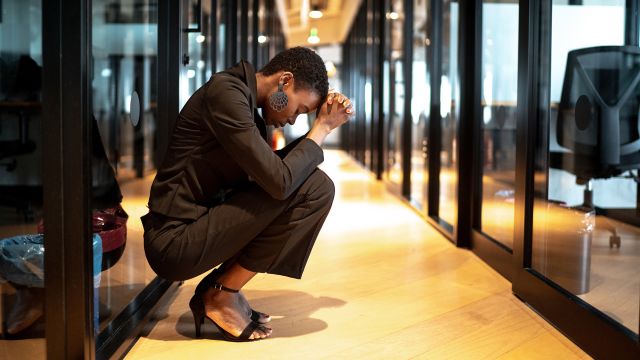Everyone experiences stress. But for many individuals who identify as Black, Indigenous or People of Color (BIPOC), common interactions can be so fraught that days become filled with a kind of stress that’s largely invisible to those around them.
The stress that results from facing racism on a daily basis compounds over time. In fact, hundreds of studies have shown a link between racist experiences and chronic stress. This stress, in turn, raises BIPOC people’s risk of serious mental health conditions like depression, anxiety and post-traumatic stress disorder (PTSD).
Chronic stress of this sort is also an underlying cause of physical conditions like diabetes, heart disease and stroke. It contributes to adverse birth outcomes, such as preterm birth and low birth weight, and puts people at risk for premature death.
Microaggressions defined
The stress that BIPOC people experience often stems from subtle expressions of racism called microaggressions. These are comments or gestures made by non-BIPOC people or people who don’t share the same racial identity (and/or gender, sexual orientation, age or ability) and who therefore may not fully understand the implications of their actions. Examples of these acts can include:
- Asking someone where they were born (implying that they’re not American because they’re not white)
- Asking to touch a Black person’s hair or body
- Denying that a statement or action could be racist or sexist because a person “has Black friends” or “has daughters” (when, in fact, all can be true)
- Calling a person out for behaving according to their cultural norms or values
- Praising a person because they reinforce or break away from a stereotype associated with their culture; the compliment may seem positive, but it still implies the stereotype is true
Beyond microaggressions, BIPOC people can experience racism in many other settings, forms and intensities. These scenarios may involve:
- Watching racist violence play out in communities or on the news
- Losing opportunities, whether professional or social, due to discrimination or bias
- Having traumatic experiences with law enforcement and the criminal justice system
- Living with negative beliefs about oneself due to hearing repeated messages about being less valuable, powerful or capable than others
Racism is trauma
“From childhood to adulthood, I think of the daily experiences of racism in the U.S. as synonymous with being a soldier in a war zone,” says Shaquita Starks, PhD, APRN, an assistant clinical professor at Emory University in Atlanta, Georgia who researches chronic stress, mental health and quality of life among African American women caregivers and children. “The mental and emotional distress that comes from facing racism daily can lead to many of the same symptoms you would see in someone with PTSD after combat. Those symptoms include depression, anxiety, insomnia and hypervigilance—or always being in ‘survival mode’—to name a few.”
If you think of racism in this way, Starks notes, you might be able to imagine the long-term difficulties that many BIPOC individuals experience, especially when the struggle is non-stop and in many ways treated as a normal part of life in America.
What makes this type of stress so toxic?
For one thing, it starts early in life, explains Starks, and it’s unrelenting. “The stress of racism never goes away, like having a heavy rock on your back while walking up a steep hill,” she says. What’s more, since certain forms of racism are only obvious to those who experience it, many BIPOC people shoulder the burden in silence.
This may be especially true when it comes to microaggressions, which are often committed by people who don’t consider themselves racist and aren’t aware of the effect of their words and actions. The many possible interpretations of microaggressions can also cause BIPOC people to question their own experiences. They may wonder: “Did that really just happen? What did that person mean? Should I say something? Is it worth calling out?”
If they assume the risk of speaking up, BIPOC people may be faced with harsh denials or counter-accusations, resulting in more angst. The fact that some groups deny the existence of racism entirely can contribute to a sense of gaslighting, or doubting your own reality. Self-doubt can, in turn, make it more difficult to respond to future instances with confidence.
“It is gaslighting,” says Kylie Smith, PhD, associate professor at Emory School of Nursing and principal investigator on the National Library of Medicine-funded project, Jim Crow in the Asylum: Psychiatry and Civil Rights in the American South. “It goes with this idea that life in America is meant to be equal for everybody, and yet BIPOC people are not treated the same. They're constantly having to negotiate these different realities.”
This gaslighting contributes to a dilemma:
- If you speak up, you may be punished for it.
- If you stay quiet, you’ve allowed yourself to be taken advantage of and you may have put other BIPOC people at risk. Doing nothing can contribute to guilt, low self-esteem and other painful emotions.
This burden of responsibility, and the sense of feeling wrong no matter what you do, can increase stress and contribute to mental illness.
Living in survival mode
For many BIPOC people, the “fight or flight” response rarely gets a chance to rest. This process is ordinarily set in motion when any person encounters a threat. The brain floods the body with stress hormones that trigger a series of survival tasks, like making the heart beat faster and having the lungs take in more oxygen. When the threat goes away, your body should return to a resting state. But for BIPOC people, the threat of racism never subsides, so it’s rare to be fully at ease.
Several studies show that racist incidents prompt BIPOC people’s brains to release the stress hormone cortisol, which plays a central role in the fight or flight response. When stress is ongoing, cortisol levels stay high for prolonged periods. Everyone’s body uses cortisol, but having dangerously high levels over time can contribute to illnesses like major depression.
Depression is, in fact, the number one reported mental health condition among BIPOC people. People who self-identified as Black or African American were more than twice as likely as white people to report feeling down, depressed or hopeless more than half the days during the previous two weeks, according to a June 2020 snapshot survey from Sharecare’s Community Well-Being Index (CWBI).
This is particularly concerning because major depression is associated with the greatest personal, social and economic costs of any other mental health disorder.
“On top of this, there are well-documented differences in the way healthcare providers diagnose and treat depression across different groups,” says Smith. “We know that Black men are four times more likely to be diagnosed with schizophrenia instead of depression, compared to white men, even when they have the same symptoms.” This can cause them to receive aggressive treatments that aren’t medically necessary while they miss out on the care they need.
What can be done?
Not every person who experiences racism may feel comfortable in healthcare or therapy settings. Reasons BIPOC people may feel this discomfort can include:
- An overall lack of trust in American healthcare systems
- Memories of discrimination or microaggressions committed by counselors in the past, including those who might have minimized or misunderstood accounts of racism
- Cultural differences between providers and patients that can cause misunderstandings
- Shortages of BIPOC therapists
If you choose to talk to a therapist about racism, it’s important to seek out one who is trauma-informed, recommends Starks. These providers recognize that racism is trauma and should be treated as such.
“It would be great if therapists resemble or share characteristics with the patient,” she adds. “But if that is not possible, you at least want a specialist who’s received training to recognize trauma and who has a strong sense of empathy and a willingness to tackle conversations about race.”
You can locate a specialist through the National Center for Trauma-Informed Care, the National Child Traumatic Stress Network or the Inclusive Therapists Network. If you prefer an alternative to therapy, other mental health options include:
- BEAM, or the Black Emotional and Mental Health Collective
- Black Men Heal: A group that helps BIPOC men heal themselves and others through peer-to-peer support, community resources, education and BIPOC-led mental health services
- WeRNative: A resource designed to protect Native culture, build healing relationships and share information on mental and physical health; it also helps to promote inclusivity for Native and Indigenous people of all gender identities
- Self-guided mental health apps like The Safe Place or Liberate
Taking action, finding support
According to some research, BIPOC people who consider racist interactions to be a “fact of life” and who opt not to share or challenge their experiences tend to have greater mental distress over time than those who take empowered action.
Action can look different for each person. It may involve seeking support from peers, practicing self-care, advocating for social justice or working toward positive change in your community.
Allies can help ease some of the emotional burden that BIPOC people shoulder by speaking out against microaggressions when they occur. Here’s one approach:
- Point out the microaggression using a calm voice.
- Acknowledge that the person’s intent was not to do harm, but that the effect of their actions may have been hurtful anyway.
- If you’re a white person or someone who occupies a similar social space as the person you’re calling out, it can help to admit that others once told you the same thing and you feel it’s important to pass the information on.
If you receive feedback that you’ve committed a microaggression, thank the person who said something and be willing to have a conversation. It takes courage to speak up for one’s self, even among friends. Recognizing that and demonstrating a willingness to change can have a positive impact on people’s well-being.
“When BIPOC people share their experiences, listen without judgment or defensiveness,” says Starks. “Acknowledge what they’ve been through and figure out how you can ease some of that burden through daily work and empathy.”
This article is one part of a series on the health effects of racism.







